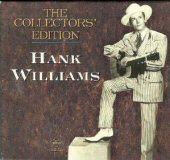 HANK WILLIAMS: THE COLLECTORS’ EDITION (MERCURY)
HANK WILLIAMS: THE COLLECTORS’ EDITION (MERCURY)
Arguably the single most important figure in the history of Country Music, Hank Williams is one of a handful of American artists whose contributions changed the way we listen to music. Your Cheatin’ Heart, I’m So Lonesome I Could Cry, Move it on Over, Hey Good Lookin’, Cold, Cold Heart… the list of hits is enormous. In the truest sense these are folk songs, the term Williams preferred to describe his music.
First recording in 1946, Williams entered into the fray at a time when Country and Western music was characterized as simplistic hillbilly hokum. Almost single-handedly he would change such perceptions, winning the attention and respect of the entire industry. Williams’ songs have been covered by literally thousands of artists. Everyone from Tony Bennett to The Grateful Dead have included some Hank in their repertoire.
Williams also recorded as Luke The Drifter, a character whose moralistic tales stressed honesty, integrity and love of God. Luke was created in order that Williams could record gospel and spiritual songs apart from his more rowdy “honky tonk” image. Like a latter-day Will Rogers, Luke mixed age-old truths with humor. Although the recordings sold only a fraction of the number released under Hank’s own name, he was insistent on cutting these sides throughout his career. Williams explained one Luke recording, Men with Broken Hearts to a journalist: “…somebody that fell, he’s the same as before he fell, ain’t he? Got the same blood in his veins. How can he be such a nice guy when he’s got it and such a bad guy when he ain’t got nothin’?” The Luke character offered sage advice, most of which Williams himself evidently ignored.
Was Williams right by God? Raised in the church, he attended countless gospel meetings where the lessons learned would last a lifetime. Of the four selections recorded on his first session, three were spirituals. Likewise, the final song he ever recorded was Are You Walkin’ and a Talkin’ For the Lord. The last full concert Williams gave included a number of gospel tunes.
Hank would tell interviewers that as far as inspiration, he just closed his mind and let God write his songs. It would be ridiculous to suggest that these songs are revelation from God, but they could certainly be considered revelation from man. The awareness of right and wrong is present throughout many of his finer songs.
Yet Williams was a mess of contradictions. He was a hopeless drunk, manipulative and violent. In addition to a serious drinking habit developed at 11 years old, Williams spent much of his short life addicted to pain killers. Initially resulting from a congenital spinal problem (spina bifida), the condition was compounded after being thrown from a horse at age 17. The situation was further exasperated through beatings endured at the hands of a domineering mother (his father was institutionalized for drinking and mental problems when Hank was a child). Leaving home early, he married a woman (Miss Audrey) who would continue the physical abuse. Their relationship was legendary, with knock-down fist fights and chronic unfaithfulness practiced by both parties.
While he never made excuses, one cannot discount his upbringing: a lifetime of physical abuse, an absent father and addiction to pain killers make a potent recipe for failure.
Near the end of his life Hank found a friend who could be trusted to stay regardless of hit records. He met Father Harold Purcell during a hospital stay on one of his periodic attempts to dry out. Purcell detected in Hank none of the arrogance he had expected, instead an individual inquisitive and knowledgeable regarding scripture. The two quickly became friends. Sadly, Purcell would die only a few months later.
Williams never made it to his 30s. When he died on Jan 1st, 1953, his body was wracked with a deadly combination of alcohol, morphine, and chloral hydrate. Always sickly, near the end, a heart condition became obvious as well. In the final year of his life he met up with a doctor who, much like Elvis Presley’s notorious Dr. Nick, freely prescribed his patient whatever was requested, regardless of long term implications. While it’s obvious Williams was on a fast track to an early death, Marshall certainly hastened that inevitability.
Williams created beauty in a world that appears anything but conducive to individual expression. It is a remarkable irony that out of such a pained life the music produced continues to bring so many listeners pleasure.
This package is a powerful testimony to a remarkable talent. With a recording career barely spanning 6 years, no one has ever challenged his position as king of country music. Presented chronologically, The Collector’s Edition contains 169 recordings, nearly every track Williams recorded, both under his own name and as Luke the Drifter.
© John Cody 1996
